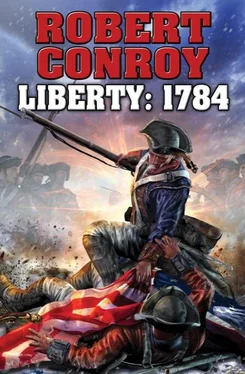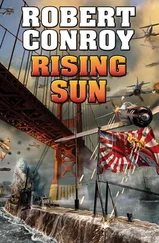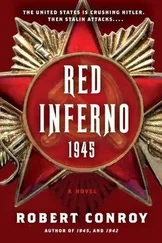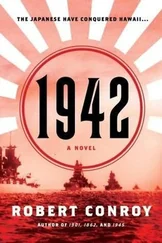Robert Conroy - Liberty - 1784
Здесь есть возможность читать онлайн «Robert Conroy - Liberty - 1784» весь текст электронной книги совершенно бесплатно (целиком полную версию без сокращений). В некоторых случаях можно слушать аудио, скачать через торрент в формате fb2 и присутствует краткое содержание. Жанр: Альтернативная история, на английском языке. Описание произведения, (предисловие) а так же отзывы посетителей доступны на портале библиотеки ЛибКат.
- Название:Liberty: 1784
- Автор:
- Жанр:
- Год:неизвестен
- ISBN:нет данных
- Рейтинг книги:4 / 5. Голосов: 1
-
Избранное:Добавить в избранное
- Отзывы:
-
Ваша оценка:
- 80
- 1
- 2
- 3
- 4
- 5
Liberty: 1784: краткое содержание, описание и аннотация
Предлагаем к чтению аннотацию, описание, краткое содержание или предисловие (зависит от того, что написал сам автор книги «Liberty: 1784»). Если вы не нашли необходимую информацию о книге — напишите в комментариях, мы постараемся отыскать её.
Liberty: 1784 — читать онлайн бесплатно полную книгу (весь текст) целиком
Ниже представлен текст книги, разбитый по страницам. Система сохранения места последней прочитанной страницы, позволяет с удобством читать онлайн бесплатно книгу «Liberty: 1784», без необходимости каждый раз заново искать на чём Вы остановились. Поставьте закладку, и сможете в любой момент перейти на страницу, на которой закончили чтение.
Интервал:
Закладка:
Charles Cornwallis chuckled. “I suppose I’ll obey my orders, presuming they make any sense. Of course, I’m not sure it makes any sense at all to ship an army, however small, over here when the real war is taking place in France.”
Shortly after the French and American collapse, an attempt by the French monarchy to raise taxes to pay for the debacles had resulted in France being torn apart by a sudden and violently anti-monarchist revolution. The new taxes had started a civil war that was rending France into bloody pieces. Horrified by the violence of the revolution in France, and tormented by the possibility of a similar republican uprising in England, King George III had sent over an army led by Lord Jeffrey Amherst to France to help the monarchists crush the revolution. France was where most professional soldiers wished to be and was where Charles Cornwallis thought he should be. Still, he had doubts. Yorktown had taught him the fickleness of fate on the battlefield.
France was also a war that was not going particularly well for England. The small British army had not had a major impact in trying to restore its version of order on the French, and the efforts of the French monarchists had been just as dismal. As a class, both Cornwallis brothers considered the French aristocracy to be a pack of fools.
“And just how popular is Burgoyne’s adventure in England?” Charles asked.
“Emotions are mixed,” his younger brother answered. “Many wish Burgoyne a swift victory, while others want the rebels left alone, feeling that enough blood and treasure has been spent in subduing the colonies. Others feel that the rebellion in France might spread to the English peasants and that terrifies them. In sum, the war against the American rebels is unpopular with a sizeable portion of the English people and that includes a growing number in Parliament. Burgoyne will have but one chance to win. If he fails, there will, at best, be an independent American nation out in the west. It is entirely possible that all of the colonies would rebel again and win.”
“I will meet with Burgoyne shortly,” Sir Charles said with a hint of distaste. “The man is too flamboyant for my taste, and he did lose an army at Saratoga.”
His brother laughed, “Whereas you only almost lost one at Yorktown.”
Sir Charles grinned happily. “All right, you have me there. And of course I have advance knowledge that he is here to do something about that damned rebel enclave out west and I’m going to be ordered to render whatever assistance possible while, at the same time, governing thirteen fractious and largely unrepentant colonies in the King’s name.”
Billy Blue Cornwallis made a mock bow. “And of course you will obey your orders like a good soldier and to the best of your ability.”
Governor General Sir Charles Cornwallis matched his younger brother’s bow, “Up your arse, Billy.”
* * *
Major James Fitzroy followed General Burgoyne into Lord Cornwallis’ large but surprisingly spartan office in Fort George at the foot of Manhattan Island. Cornwallis took one look at Fitzroy and made a gesture that he should leave. Fitzroy did as told, but positioned himself outside the door so that he could hear the conversation, just as Burgoyne had earlier told him to.
Cornwallis was stood behind a large desk and table which was littered with papers. “What on earth were our lords in London thinking, General Burgoyne?” he said after formally acknowledging the other’s presence.
“I believe it’s quite simple, General,” Burgoyne said with a hint of smugness. “We all want the rebels finally crushed and that is my assignment. When the rebels are destroyed, peace will be assured and then the second phase of pacification will begin.”
“I have no problem with your taking on the rebels in their forest lair, but it is Lord North’s concept of pacification that disturbs me.”
“Oh?”
Cornwallis looked through a window at the harbor. Scores of warships and transports were anchored near the fort, and unloading large numbers of men and vast quantities of supplies. Even so, the harbor of New York was so enormous it somehow seemed largely empty. The large expanse of protected water hinted at what the North American colonies could become with the proper British control. New York had the potential to become one of the world’s major ports.
Cornwallis turned and faced his guest. “Several things bother me. First is the amount of taxes the colonists are going to have to bear. Yes, I know the war has to be paid for somehow, but we are now going to heavily tax those people who supported us in the rebellion and remained loyal, and that bothers me immensely. Please don’t forget that the colonists were divided into three unequal parts. There were the rebels, the loyalists, and those who stayed uninvolved. The rebels should be punished, but not the others.
“Second is the idea of restrictions on jobs, pay, and travel. London seems to be hell bent on turning the remaining colonists into medieval serfs. Benjamin Franklin said that he foresaw England turning these colonies into something equivalent to Ireland-a land full of impoverished and sullen people, governed harshly. If that is the case, it would be a very foolish policy indeed. The Irish are unarmed and have no place to flee to, but it is totally different here. Many, perhaps most, Colonists have their own weapons, and they are perfectly capable of both using them and going westward. This is what so many have done, and which is why you are here.”
Burgoyne made to interrupt but Cornwallis stopped him. “Then there is the king’s idea of establishing a North American nobility to oversee and overawe the poor benighted peasants. What will they do, make Benedict Arnold the Duke of Pennsylvania? Or would Earl of West Point be more appropriate? Lord, that would be ironic justice, wouldn’t it? Will every hamlet and village have its overweight and over-dull squire with his fat and unmarriageable daughters?”
Even though he didn’t like what Cornwallis was saying, Burgoyne had to smile. “Please don’t forget the poor sod’s shrew of a wife.”
Cornwallis laughed at the mental picture. “Oh, that’ll inspire loyalty to the crown. Is the king aware that a previous monarch, James II, tried pretty much the same thing a century or so ago? It failed miserably, and it was one of the factors in James Stuart losing his crown. The colonists have no history of nobility and are singularly unimpressed by titles. Even the loyalists will resist such efforts. Many of the most loyal will insist on the colonial custom of shaking hands as if with equals instead of bowing to one’s betters.”
Burgoyne had turned almost beet red. “And why do you imply that our efforts will fail?” Burgoyne said. “We must have peace and economic stability to support our war in France. There cannot be an enemy in our rear.”
“Of course we must have peace,” Cornwallis replied sarcastically. “Let me see. Since the collapse of the rebellion, the French monarchy has been assailed by two groups. First are the Constitutionalists under the boy general, Lafayette, and the second are the Republicans, who are little more than an armed mob intent on killing everyone who disagrees with them. The Constitutionalists wish to control the king, while the Republicans wish to depose him. Either group frightens our king and his lordships in London since, if successful, the disease of rebellion could spread to England’s own sullen peasants.
“The two groups have chased King Louis out of Paris and off to Calais, where he is protected by the Royal Navy and the British Army. They are trying mightily to put him back on his throne with the help of the third group, the supporters of the status quo. This includes just about everybody the average Frenchie hates, and that includes an incredibly corrupt Papist clergy.”
Читать дальшеИнтервал:
Закладка:
Похожие книги на «Liberty: 1784»
Представляем Вашему вниманию похожие книги на «Liberty: 1784» списком для выбора. Мы отобрали схожую по названию и смыслу литературу в надежде предоставить читателям больше вариантов отыскать новые, интересные, ещё непрочитанные произведения.
Обсуждение, отзывы о книге «Liberty: 1784» и просто собственные мнения читателей. Оставьте ваши комментарии, напишите, что Вы думаете о произведении, его смысле или главных героях. Укажите что конкретно понравилось, а что нет, и почему Вы так считаете.












